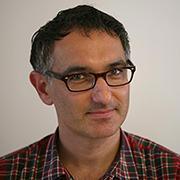Senior Lecturer, Department of Pathology, Sackler School of Medicine, Tel Aviv University
Prof. Michael Milyavsky

Positions
Biography
Education
| 1991-1994 | B.Sc., Life Sciences | Bar Ilan University |
| 2000-2005 | Ph.D., Molecular Cell Biology | Weizmann Institute of Science |
| 2005-2012 | Post-doctoral Fellow at the laboratory of Dr. J.E. Dick | University Health Network- Toronto, Canada |
| 2005-2012 | Post-doctoral Fellow | Ontario Institute for Cancer Research |
Research
DNA Damage Response Mechanisms in Human Hematopoiesis
Life-long blood regeneration is critically dependent on self-renewing multipotent hematopoietic stem cells (HSCs). These cells’ nearly unlimited self-renewal potential and lifetime persistence in the body, in contrast to the committed progenitors (CPs), signifies the need for tight control of HSC genome integrity. Indeed, accumulation of unrepaired DNA damage in HSCs is associated with bone marrow (BM) failure and accelerated leukemogenesis. Recent findings from our and other laboratories have revealed striking differences in DNA-damage response (DDR) characteristics between HSCs and CPs, especially in their DNA-repair activities and propensity for apoptosis. However, the molecular basis and physiological significance of the HSC-specific DDR characteristics are only partially understood.
In our experiments we utilize novel cell-purification strategies, powerful loss- and gain-of-function genetic manipulations and the most sensitive in-vivo xenotransplantation assays for human hematopoiesis.
In our laboratory we pursue the following projects to address the molecular basis underlying HSC-specific responses to DNA damage:
- DDR characterization in human HSCs isolated at different ontogenic stages.
- Examination of DNA double strand break repair pathways in human HSCs.
- Identification and characterization of molecular mechanisms connecting the DDR with self-renewal pathway in human HSCs.
- Construction of gene regulatory networks responsible for the acquisition of a DNA-damage-tolerant state in human leukemia stem cells.
Publications & Grants
Research Articles
Milyavsky, M., A. Mimran, S. Senderovich, I. Zurer, N. Erez, I. Shats, N. Goldfinger, I. Cohen, and V. Rotter. 2001. Activation of p53 protein by telomeric (TTAGGG)n repeats. Nucleic Acids Res 29:5207-15.
Milyavsky, M., I. Shats, N. Erez, X. Tang, S. Senderovich, A. Meerson, Y. Tabach, N. Goldfinger, D. Ginsberg, C. C. Harris, and V. Rotter. 2003. Prolonged culture of telomerase-immortalized human fibroblasts leads to a premalignant phenotype. Cancer Res 63:7147-57.
Milyavsky, M., Y. Tabach, I. Shats, N. Erez, Y. Cohen, X. Tang, M. Kalis, I. Kogan, Y. Buganim, N. Goldfinger, D. Ginsberg, C. C. Harris, E. Domany, and V. Rotter. 2005. Transcriptional programs following genetic alterations in p53, INK4A, and H-Ras genes along defined stages of malignant transformation.Cancer Res 65:4530-4
Milyavsky, M., I. Shats, A. Cholostoy, R. Brosh, Y. Buganim, L. Weisz, I. Kogan, M. Cohen, M. Shatz, S. Madar, E. Kalo, N. Goldfinger, J. Yuan, S. Ron, K. MacKenzie, A. Eden, and V. Rotter. 2007. Inactivation of myocardin and p16 during malignant transformation contributes to a differentiation defect. Cancer Cell 11:133-46
Milyavsky, M., Gan, O. I., Trottier, M., Komosa, M., Tabach, O., Notta, F., Lechman, E., Hermans, K. G., Eppert, K., Konovalova, Z., Ornatsky, O., Domany, E., Meyn, M. S., and J. E. Dick. 2010. A distinctive DNA damage response in human hematopoietic stem cells reveals an apoptosis independent role for p53 in self-renewal. Cell Stem Cell: 7(2): 186-97.
Chan G, Cheung LS, Yang W, M. Milyavsky, Sanders AD, Gu S, Hong WX, Liu AX, Wang X, Barbara M, Sharma T, Gavin J, Kutok JL, Iscove NN, Shannon KM, Dick JE, Neel BG, and B.S. Braun. 2011. Essential role for Ptpn11 in survival of hematopoietic stem and progenitor cells. Blood 117(16): 4253-61.
Louria-Hayon I., Ruston J.C.F., , Gish G, Jin J, Kofler M. M., Lambert J-P., Adissu H. A., Milyavsky M, Herrington R., Minden M. D., Dick J. E., Gingras A-C., Iscove N. N., and T. Pawson. 2013. The Lnk adaptor suppresses radiation resistance and radiation-induced B-cell malignancies by inhibiting IL-11 signaling. PNAS 110(51):20599-604.
Reviews
Biechonski, S., and M. Milyavsky. 2013. Differences between Human and Rodent DNA-Damage Response in Hematopoietic Stem Cells: at the Crossroads of Self-Renewal, Aging and Leukemogenesis. Translational Cancer Research 2 (6):372-383


